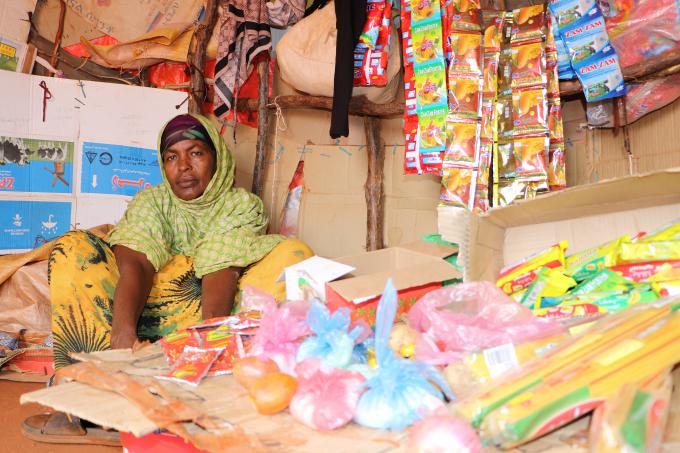A Determined Widow in the Wilderness
Improving livelihoods in Ethiopia
In a village named Beliguyow, nearly 40 km from Daror, a tiny town in the deep desertsof Somali Region, Meriam Mohammed and her husband lived happily with their three kids. They were pastoralists, the main livelihood in the area. They owned 46 goats and a few donkeys. Not only did they have a sustainable source of meat and milk, they also sold dairy products to people in the community and earned decent money.
This is now a distant memory from three years ago. The drought turned everything upside down. Meriam’s husband tragically lost his life to the Acute Watery Diarrhea outbreak that came at the onset of the drought. She remained with her three kids and later lost almost all of their cattle to the severe drought which at the time, affected 7.6 million people in the southern and south eastern parts of the country. As conditions got worse each day, she finally decided to leave the village.
Meriam uses her monthly cash allowance to buy commodities for the small stall she recently opened.
“We were left with just three goats and the two donkeys. We had to pack everything and travel for three hours on foot. With no spouse to help out, and with young children who were barely strong enough to survive the long journey through the desert, I had to endure the harsh conditions all by myself”, says Meriam reminiscing.
It has been nine months now since the forty-year-old widow started to live with her three children in a temporary settlement site in Daror, 270 km from Jigjiga, the capital of Ethiopian Somali Region. She has erected a hut with help from other women in the camp. Her daughter, who is 8 years old, is a first grader; while her two boys who are 5 and 3 years old, are yet to start school. Meriam is grateful for the support provided by Save the Children including water supply in the camp. “We used to travel for an hour and a half to fetch water from a well. Now, we have tanks full of water and we can get it any time we want”. Besides a school established and supported by Save the Children which is teaching more than 700 children, there is also a health service center which serves outpatients.
“Although we get water, school and health services; food remains one of the problems here. We receive 15 kilograms of millet each month, however, it is hardly adequate to feed our family of four. Besides, the cereal is not particularly a favorite food for children. It is hard for kids to consume it in any form. So, kids are mainly fed porridge”, says Meriam referring to the soup made of flour which is rich with nutrients provided by the Blanket Supplementary Feeding Project (BSFP). “We heard this month marks the last month for the porridge handouts scheme. We are worried. I can only rely on God who can provide food for my children”.
Dwellers of the temporary settlement site also receive a monthly cash allowance of 1,400 Ethiopian Birr (52 USD) through the Food Security and Livelihood (FSL) program. Meriam uses this money to buy commodities for the small stall she recently opened. She sells various packed goods and vegetables as well. “Since most of my customers are fellow inhabitants of the camp, business is not exactly lucrative”, Merriam comments.
FSL supports 475 households with a monthly cash allowance of 1,400 Ethiopian Birr. Other 850 families also get similar support from other humanitarian organizations.
Meriam is inclined to be uncertain about the future. “God only knows what the future holds in store for us. But I wish we could get shelter which unlike the one we currently have can protect us from rain and the sun. We also need the supplementary feeding program for our children. Since I lost everything back at home, I don’t wish to return”, she says.
 Ethiopia
Ethiopia 